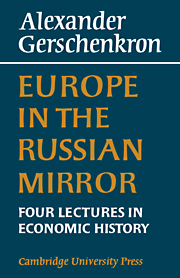Summary
The purpose of the following observations is to make plausible the proposition that, historically seen, the phenomenon of mercantilism can be usefully regarded as a function of the degree of economic backwardness of the countries concerned. A discussion of the Russian experience is designed to provide some evidence in support of that proposition and thereby cast some indirect light on interpretation of Western mercantilism.
Mercantilism, of course, has been, and possibly always will remain, a controversial term. Neither its nature nor its evaluation is unambiguously fixed in our minds. In fact, even the very existence of something corresponding to the term has been subject to doubt. Schumpeter, for instance, used to speak of an ‘imaginary organon’ or ‘imaginary entity’ called mercantilism and he wrote quite a few pages in the relevant portions of his History of Economic Analysis before, either from forgetfulness or a change of mind, he stopped placing the word between deprecatory quotation marks.
Even Heckscher felt that a word on the existence of mercantilism was in order, and he argued that while mercantilism never existed in the sense in which Colbert or Cromwell did, it has specific existence as an ‘instrumental concept’. But this, if I may say so of a pronouncement of a man for whose work and memory I have the highest regard, is a rather trite statement. As Goethe rightly said, ‘everything factual is already a theory’.
- Type
- Chapter
- Information
- Europe in the Russian MirrorFour Lectures in Economic History, pp. 62 - 96Publisher: Cambridge University PressPrint publication year: 1970



